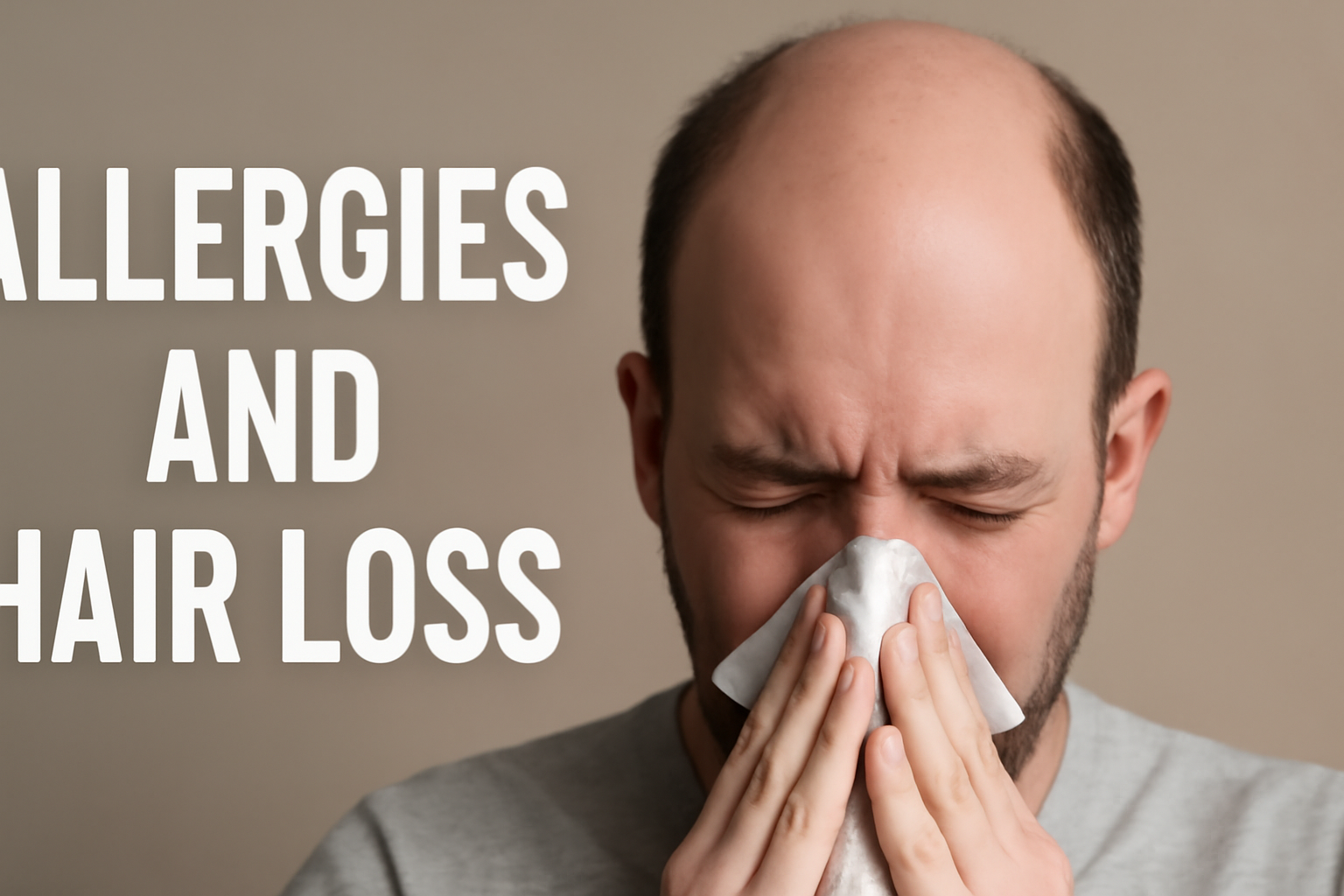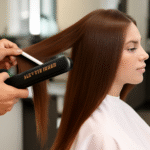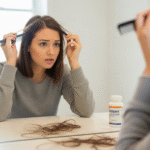Allergies and Hair Loss is often a challenging experience, especially when the cause is not immediately clear. While genetic factors, stress, and hormonal imbalances are commonly blamed, allergies are an often-overlooked contributor to hair loss. Allergies can trigger immune responses that cause scalp irritation, inflammation, and even direct damage to hair follicles. In this article, …
Allergies and Hair Loss is often a challenging experience, especially when the cause is not immediately clear. While genetic factors, stress, and hormonal imbalances are commonly blamed, allergies are an often-overlooked contributor to hair loss.
Allergies can trigger immune responses that cause scalp irritation, inflammation, and even direct damage to hair follicles. In this article, we’ll explore the connection between allergies and hair loss, the signs to watch for, and practical solutions for managing this issue.
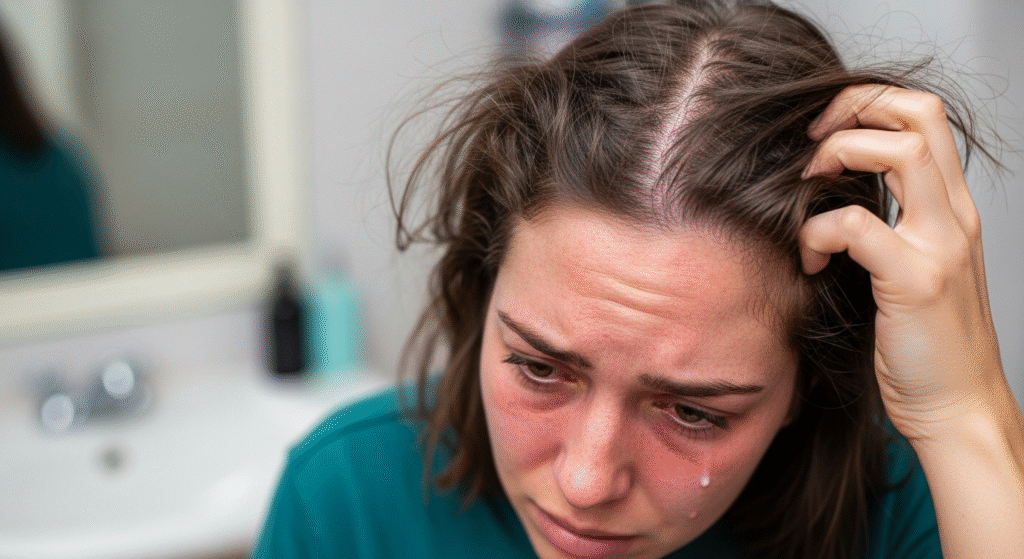
How Allergies Trigger Hair Loss
Allergic reactions can cause hair loss through a combination of factors, including immune system responses and scalp inflammation. Understanding how this happens can help you identify the signs early and take appropriate action.
Immune System Response and Inflammation
When your body encounters an allergen, the immune system responds by releasing chemicals like histamine to protect you. This process often results in inflammation, which can affect various parts of your body, including your scalp.
Chronic inflammation can disrupt the hair growth cycle, leading to telogen effluvium, a condition where hair enters the shedding phase prematurely.
Telogen Effluvium Induced by Allergies
Telogen effluvium is one of the most common types of hair loss triggered by allergic reactions. This condition occurs when the body experiences a significant stressor — in this case, an allergic reaction.
The result is widespread hair shedding that can last for several weeks or months. While this type of hair loss is typically temporary, it can still cause noticeable thinning, particularly around the scalp.
Scalp Irritation and Hair Follicle Disruption
Scalp irritation due to allergens like pollen, dust, or certain hair care products can directly affect hair follicles. Constant scratching, swelling, and redness can weaken the follicles, making it difficult for hair to grow properly. Over time, this can cause hair thinning and even permanent hair loss in extreme cases.
Common Allergens Linked to Hair Loss
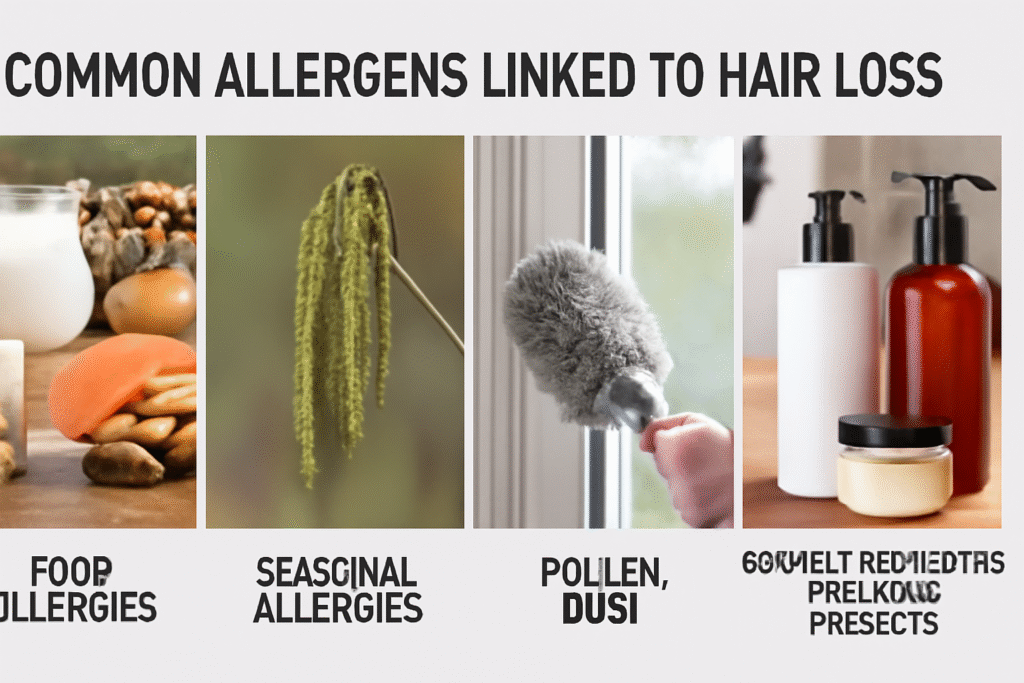
Certain allergens are more likely to contribute to hair loss due to their direct or indirect impact on the scalp and immune system. Identifying and managing these allergens can help reduce the risk of hair loss.
Food Allergies and Hair Loss
Food allergies can trigger systemic inflammation that affects the scalp. Common culprits include dairy, gluten, and seafood, which can lead to immune responses that disrupt the hair growth cycle.
In some cases, an allergic reaction to food can also cause scalp irritation that exacerbates hair loss.
Seasonal Allergies (Pollen, Dust)
Seasonal allergies, especially those triggered by pollen and dust, can lead to hair shedding in individuals who are already susceptible to hair loss.
The immune response to these allergens can cause inflammation in the scalp, leading to temporary hair loss. Additionally, sneezing, eye rubbing, and constant exposure to allergens can cause physical irritation that exacerbates the shedding process.
Contact Dermatitis from Hair Products
Contact dermatitis, an allergic reaction to ingredients in hair products, can also contribute to hair loss. Ingredients like sulfates, parabens, and fragrances in shampoos, conditioners, and styling products can irritate the scalp, causing itching, redness, and inflammation. This leads to weakening of the hair follicles and premature hair loss.
Recognizing the Signs of Allergies and Hair Loss
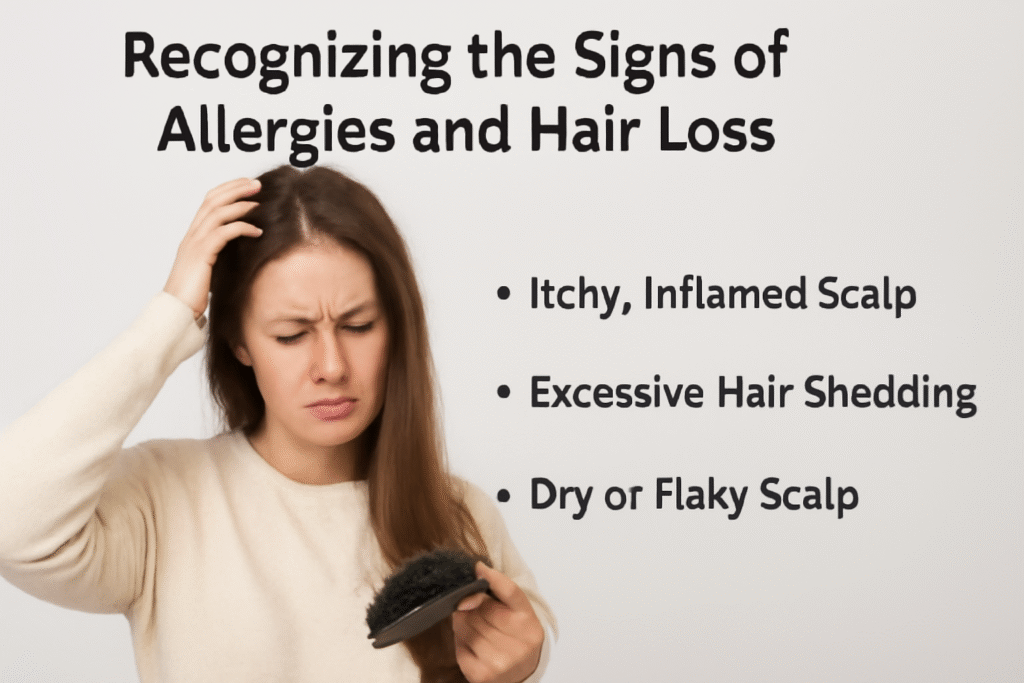
If you’re experiencing unexplained hair loss and suspect it may be linked to allergies, there are several signs to watch for. Identifying these symptoms early can help you seek appropriate treatment before the issue worsens.
Itchy, Inflamed Scalp
One of the most common symptoms of allergy-induced hair loss is an itchy scalp. Allergens like dust, pollen, and hair product chemicals can irritate the scalp, causing intense itching and discomfort. Inflammation may also occur, leading to redness and visible irritation on the scalp.
Excessive Hair Shedding
If you notice more hair than usual falling out during brushing or washing, it may be due to an allergic reaction. Telogen effluvium, the condition caused by allergy-induced stress, often leads to excessive shedding. This is typically diffuse, affecting all areas of the scalp.
Dry or Flaky Scalp Due to Allergies and Hair Loss
A dry, flaky scalp can be a sign of contact dermatitis or other allergic reactions. The skin may become dry and flaky as a result of inflammation, which can lead to hair loss if left untreated. In severe cases, the scalp may also develop scabs or crusts that further damage the hair follicles.
Diagnosis and Treatment Options For Allergies and Hair Loss

If you suspect that allergies are contributing to your hair loss, it’s essential to seek a proper diagnosis from a dermatologist. Here’s how the process typically unfolds:
Consultation with a Dermatologist
A dermatologist will examine your scalp and hair and may conduct allergy tests to determine the specific allergens causing your symptoms. They may also ask about your medical history and lifestyle to identify any other potential causes of your hair loss.
Allergy Testing
If food allergies are suspected, an allergy test can be performed to identify the trigger. Similarly, if seasonal allergens are believed to be the cause, your doctor may recommend testing to check for pollen or dust mite sensitivities. Once the allergen is identified, steps can be taken to minimize exposure.
Topical Treatments and Medications for Allergies and Hair Loss
In many cases, topical treatments like corticosteroids or antihistamine creams can help soothe an inflamed scalp. For more severe allergic reactions, oral medications such as antihistamines or steroidal treatments may be necessary. These treatments aim to reduce inflammation and promote a healthier scalp environment for hair growth.
Lifestyle Modifications and Nutritional Support
In addition to medical treatments, lifestyle changes can help manage allergy-induced hair loss. Reducing exposure to known allergens, such as staying indoors during peak pollen seasons or avoiding triggering foods, can help minimize the risk of further hair loss. Nutritional supplements like biotin, zinc, and iron can also support hair health and prevent further thinning.
Preventing Allergy-Induced Hair Loss
While it may not be possible to completely eliminate all allergens, there are steps you can take to reduce the risk of allergy-induced hair loss.
Identifying and Avoiding Triggers
The first step in preventing allergy-induced hair loss is to identify the allergens that trigger your symptoms. Once you’ve identified the cause, it’s important to avoid exposure whenever possible. For example, if you suffer from seasonal allergies, try to limit outdoor activities during high pollen seasons or use air purifiers indoors to reduce allergens.
Maintaining Scalp Hygiene
Keeping your scalp clean and free from allergens is key to preventing irritation and inflammation. Use gentle shampoos and avoid products with harsh chemicals that could trigger allergic reactions. Regularly washing your hair and scalp can help remove dust, pollen, and other irritants that contribute to hair loss.
Strengthening the Immune System
A strong immune system can help reduce the severity of allergic reactions. Eating a balanced diet rich in vitamins, minerals, and antioxidants, along with regular exercise and sufficient rest, can help improve your body’s overall health and its ability to manage allergens.
Expert Recovery Tips for Allergies and Hair Loss
Monitor your scalp health regularly and seek medical advice if you notice worsening symptoms.
Follow prescribed treatment plans to manage inflammation and minimize hair loss.
Incorporate anti-inflammatory foods like omega-3 fatty acids into your diet to support scalp health.
Avoid scratching your scalp, as it can worsen irritation and cause further hair damage.
FAQs
Can Allergies Cause Permanent Hair Loss?
In most cases, allergy-related hair loss is temporary and reversible. However, if left untreated, chronic inflammation and irritation can lead to permanent damage to the hair follicles.
How Long Does It Take to Recover from Allergy-Induced Hair Loss?
The recovery timeline depends on the severity of the allergic reaction and the treatment used. In most cases, hair loss due to allergies is reversible within a few months once the allergen is eliminated and proper treatments are started.
Are There Natural Remedies for Allergy-Related Hair Loss?
While medications are often necessary to treat allergy-induced hair loss, some natural remedies like aloe vera or tea tree oil can help soothe an irritated scalp. However, it’s important to consult with a healthcare provider before trying natural treatments.
Can Allergy Medications Affect Hair Growth?
Some allergy medications, particularly antihistamines, can cause temporary hair loss as a side effect. However, this is usually a reversible condition that resolves once the medication is discontinued.
Ready To Take Your Next Step:
If you’re struggling with allergy-induced hair loss, consult with a dermatologist to identify the allergens causing your symptoms. Early diagnosis and treatment can help restore your hair and prevent further damage.
Book a consultation Dr. Uzma Irfan, an ISHRS-certified surgeon in Islamabad today to get personalized advice and treatment options.

